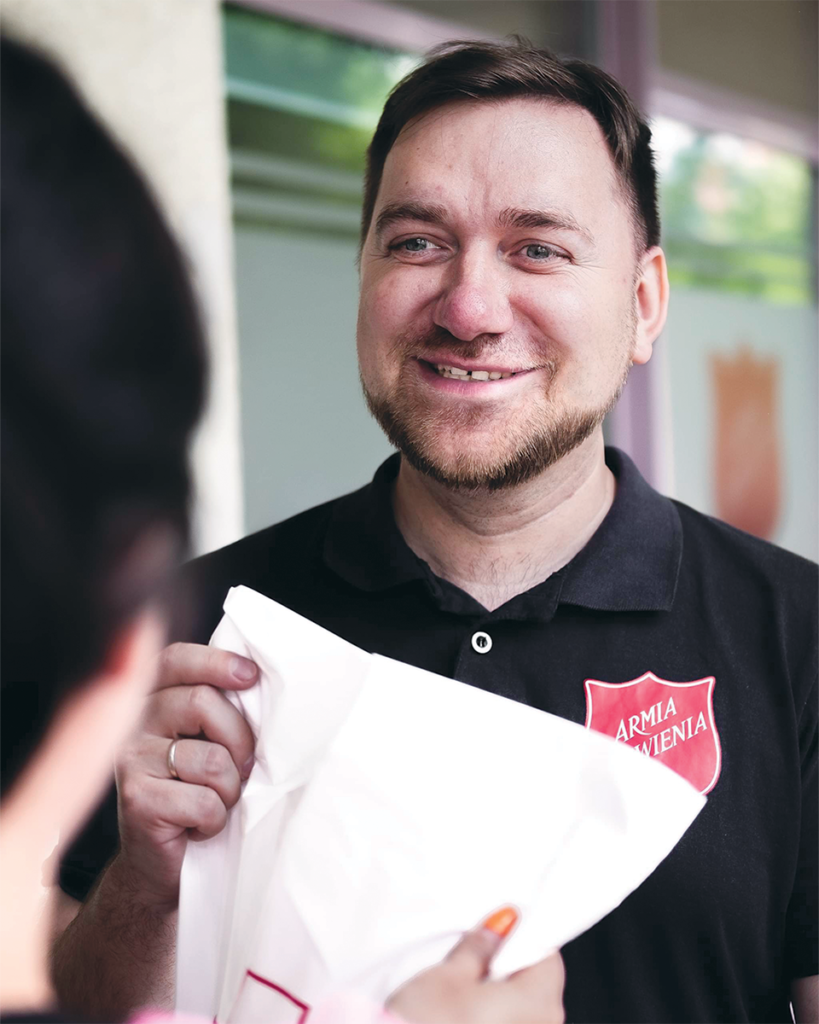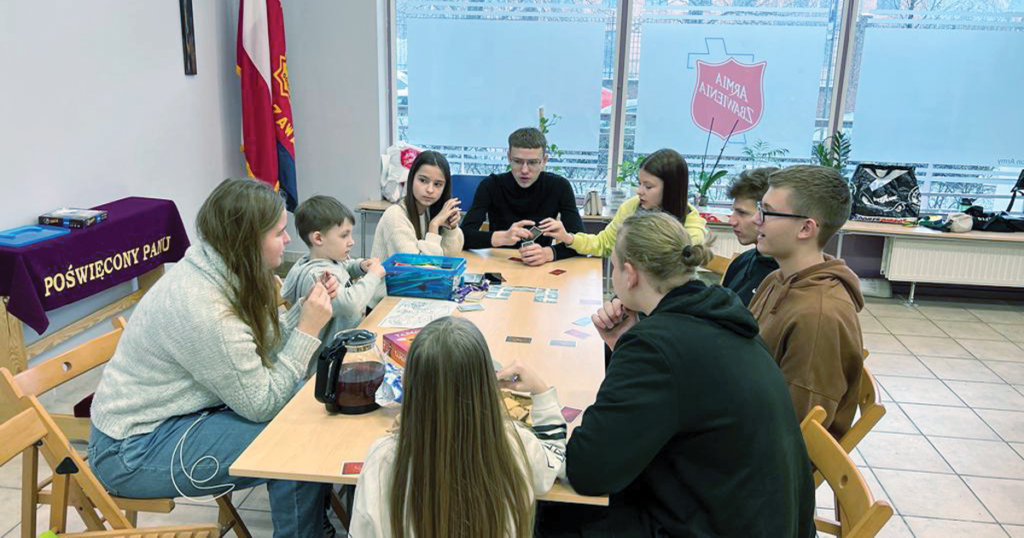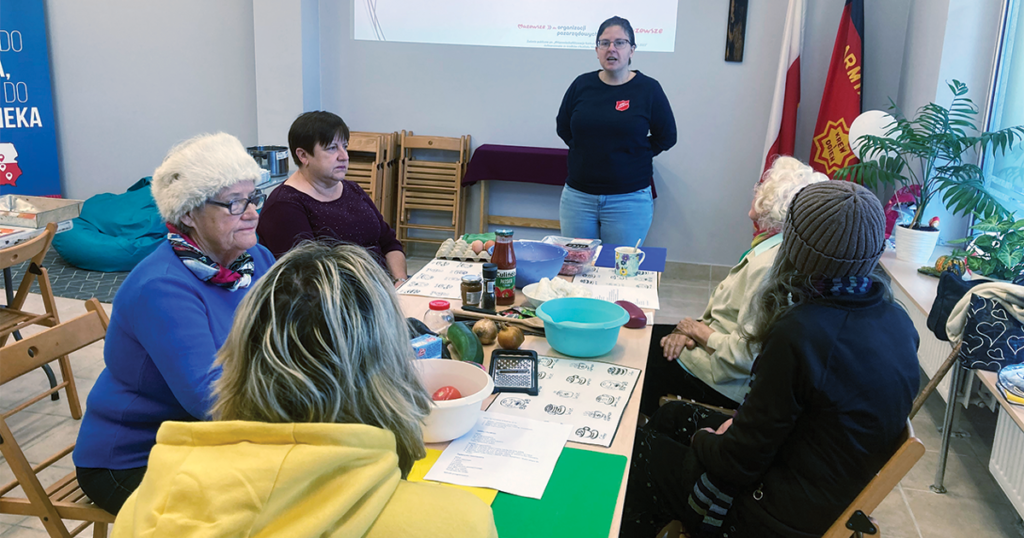Giving Help & Hope in Poland
"God tells us that we should be like light in the darkness."
An elderly woman stood waiting at the door of our community center in Warsaw. She came to Poland with her seven-year-old granddaughter, fleeing the conflict in Ukraine. On the way to Poland, her eldest granddaughter was killed in an explosion, but the woman was forced to leave her and run to the train to save her younger grandchild. She came to The Salvation Army for food and clothes, but most of all she needed to talk to someone. Almost every day we meet people at The Salvation Army who come to us because they need someone who can hear and understand. We listen and try to be there for them, even when we often can’t find the right words that will make their pain more bearable.
Our corps and community center are located in one of the poorest areas in Warsaw, where you can easily access drugs and alcohol. There are many addicts and people who need support in our neighborhood. This makes it the perfect place for The Salvation Army, which is like a lighthouse in a stormy sea. When around 13 million refugees came from Ukraine to Poland, mostly women with children and seniors, we understood the overwhelming need for our ministry, and that we couldn’t be frozen by fear and do nothing. Daily we hear from people who need shelter, food, clothing and very often basic conversation and prayer. The Salvation Army in Poland is small; there are only four corps with few facilities and resources, and our opportunities are very limited, but we are very creative and open to everyone. Despite our limitations, we always consider our benefits.
I will never forget the day when 500 people turned to our corps for help. We did not know how we could help everyone with our two-person team (my wife and myself) and just two volunteers (my mother and my aunt, who are Ukrainian refugees themselves). We sat at the reception table all day, handing out food and clothes early in the morning but more importantly listening to their stories and the tragedies that they experienced. At one point I realized that one of the women was from the street where I grew up in my native city of Kharkiv in Ukraine, where I was born and have not been for a very long time. Kharkiv has been very badly damaged by bombs and explosions, and my parents’ apartment and my old school were destroyed. Together with this woman we cried and shared memories about our district. But for more than six years now, I have been serving in Poland, which has become my new home. In this new home, I’ve seen that human needs are very similar everywhere. We all need safety, acceptance and support, no matter where we are in the world.

The Warsaw corps is very busy running programs for children, families and seniors. Every day of the week we support around 15 children from district families with hot lunch and afterschool support. Often, The Salvation Army is the only place where they will get food during the day. In the evening we meet with youth, representing at least four nationalities and speaking six different languages, but it is not a problem for us. Instead of building walls, we are building bridges. Some of these young people are refugees or came to Poland with parents who are searching for a better life. They’re often lonely and discriminated against at school but in our corps they can be themselves. Once I overheard them talking and one said, “Our Salvation Army is like my second home, only with food and love.” No matter where life will bring them in the future, they can always remember us as their home.
On Wednesdays we have ladies club. Our oldest lady, Katarzyna, is 87 years old and a WWII survivor. She worked all her life as a doctor, but now lives alone without any contact from her son. During Christmas dinner at our corps she said, “For me, a trip to The Salvation Army is like a tour abroad. I am always so excited and looking forward.” Many women like her don’t have contact with relatives or don’t have any family at all. We do our best to create an atmosphere for them where they feel loved.
In refugee crises, people are more at risk of being trafficked. In response to this, one of our ministries is an anti-human trafficking project which includes prevention workshops in schools and universities. Recently we started to educate teachers and social workers about prevention. Some time ago we started an awareness campaign called “You Are Not For Sale” to inform people of how they can protect themselves. Our materials were published on different platforms and we were invited to speak on the radio to get our message to more people. During the campaign we traveled all around Poland to meet people who are the most vulnerable. Every year there are new individuals being trafficked, most of which are foreigners. The Salvation Army in Poland is part of a governmental board that meets twice a year with other organizations and institutions (police, border security, social services) to discuss how we can work together in this fight.

Very often in our ministry we hear many depressing stories about things such as difficult family situations and the lack of hope. People seldom come to us to share positive things. So, it is very important for each of us to remember that there will not always be dark days; after rain and storms, grass and flowers grow stronger. In our situation, we are still in the storm. Poland gets news every day about new victims in Ukraine. Buses full of refugees arrive in Warsaw daily and local people still need our support, but we already see how much fruit our service is bearing. We are here for these people and maybe we are the only home they have. God tells us that we should be like light in the darkness. Don’t give up, even when it’s hard for you. When you are in the depths of the ocean, all you can do is swim up.
Captain Oleg Samoilenko is the corps officer in Warsaw, Poland.







